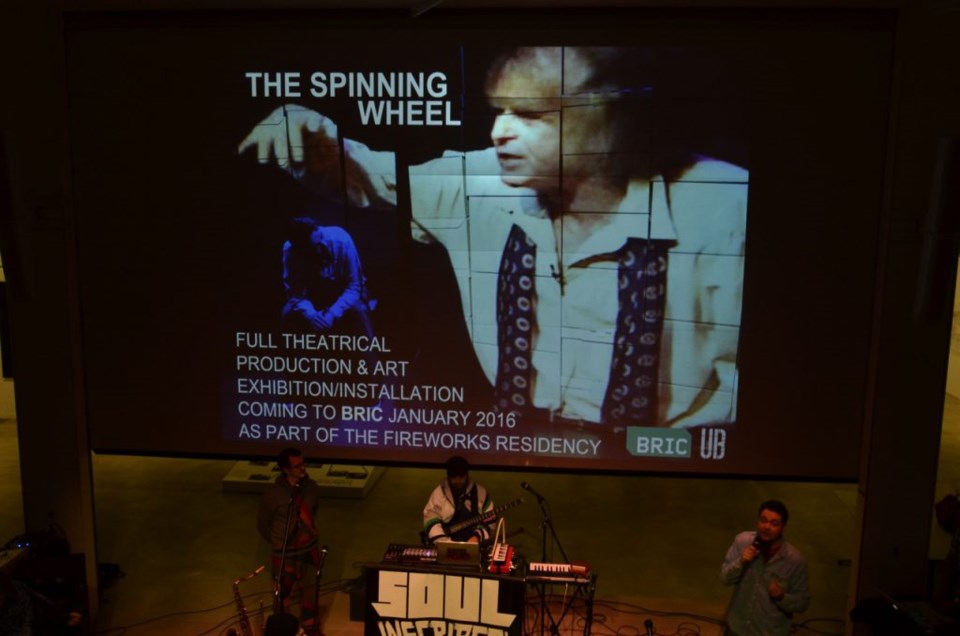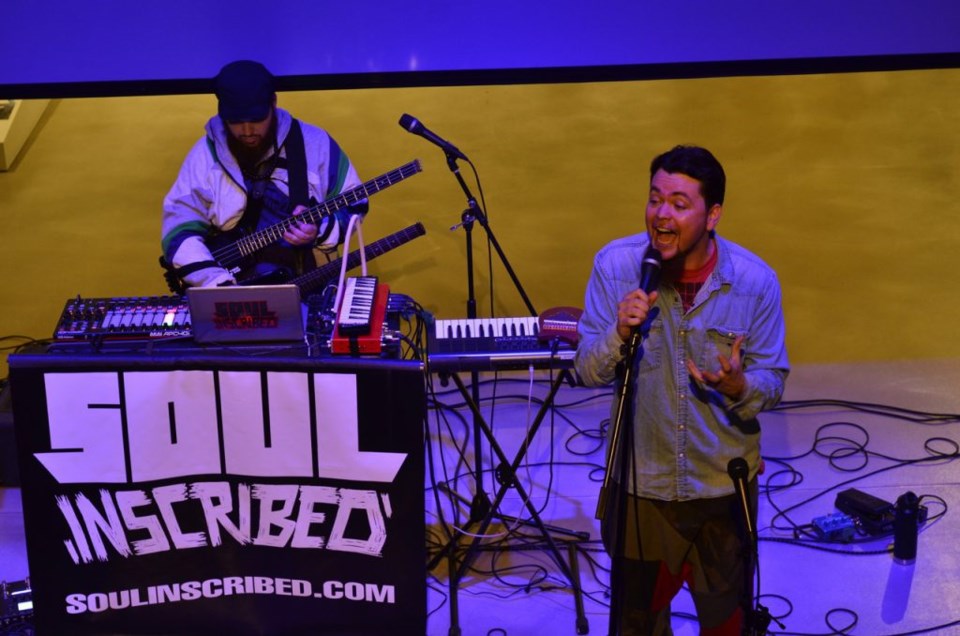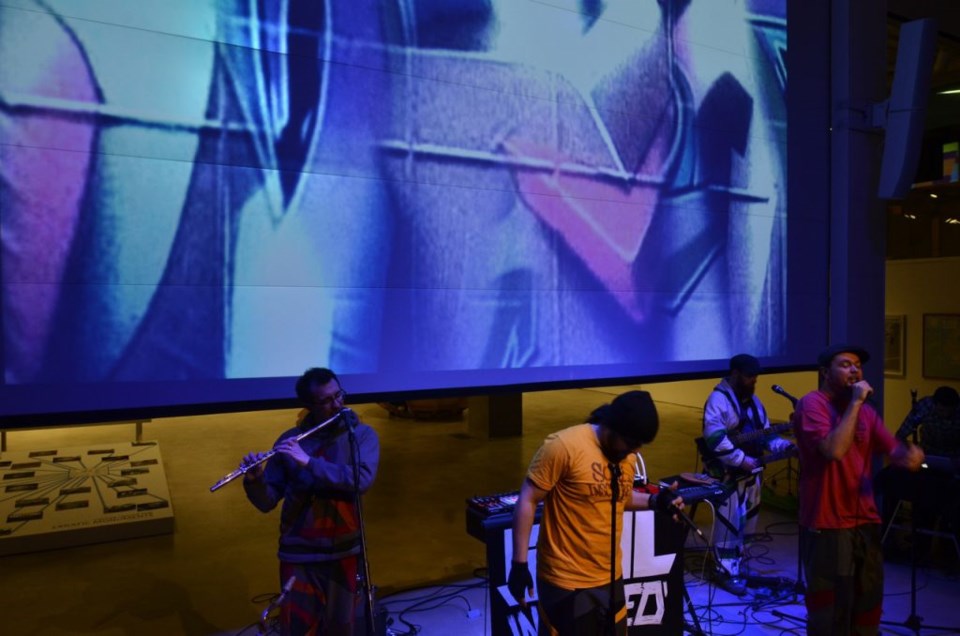
Baba Israel, purveyor of a unique soul-inspired poetic Hip-Hop, is in residence at BRIC, along with his group, Soul Inscribed, until next January when they will premiere the full-length music-theater piece "The Spinning Wheel" they are developing now.
Check them out. On March 10, they previewed the work-in-progress as part of the free Tuesday evening at 7pm Stoop Series at BRIC. Baba is an astonishingly quick-witted, inventive yet gentle rhymer and a warm and winning way. He'll take your called-out troubles, the litany of our daily grind—from court cases to car dents, rising rents and loss of homes--and weave them into a quick-paced improvised Hip-Hop chant for the purpose, he explains, of liberating our weary souls and "unfucting" us.
Gentrification and displacement are central themes. Born and raised in New York, grown to adulthood riding the subways and performing on the city streets, Baba's memories are of the richness and diversity that was this city and he preserves a particularly New York funky irreverence in his work.
He mourns lost landmarks and neighborhoods, and the people who have been driven away by rising rents, he also mourns lost friendships between himself and those wealthy ones living in the suburbs whom he cannot afford to hang with any longer. In an elegiac tone that points also toward a possible (if unlikely) future, Baba calls up the New York of his father's day, when money didn't matter and our lives were an improvised adventure, a daily inventive lark defined not by how much we had to spend but by what wonders we might think of to create. He's the child of past royalty of this vanishing and imperiled world of New York art and artists.

His father, the late Steve Ben Israel, actor and comedienne, friend of Allen Ginsberg and Amiri Baraka, central member of Julian Beck and Judith Malina's Living Theatre, was a unique contributor to the art worlds of the beats, experimental theater and, later, stand-up comedy. Irrepressible, Steve once made an impromptu performance piece of sorts by handing out dollar bills to strangers in the subway. "Next time a homeless person asks you for some money, give him a quarter. You'll still be 75 cents ahead," Baba tells us in a fond reminiscence that dovetails into sharp verbal snap-shots of the pulls on his own life, as an artist, father, husband, and caretaker-son to his widowed mother.
I've known Baba since he was a babe in the arms of his parents Steve and Pamela Badyck, an actor, dancer, mask-maker. They were living on St. Felix St. in a then dilapidated brownstone on a broken street alongside the Brooklyn Academy of Music at the largess of Harvey Lichtenstein, BAM's founder, who had lent the house with its ruptured floors, rickety stairs and roaches to the Living Theater.
The St. Felix St. house allowed the experimental theater company to live communally while rehearsing The Tower play, about, in fact, income inequality. On the then empty top floor of the BAM building, in what was to become the trendy BAM café, a four story Money Tower had been built to tell the story through bio-mechanical theater movement of the huddled masses at its base and the few (we call them, now, the 1%) on its top floor. Baba, a baby, was soaking up the vibes at every rehearsal.

Baba's full-length music-performance work at BRIC next January is intended to pay tribute to his father, but on the evidence of last night's workshop presentation it will be made from the son's distinctive musical and poetic voice and vision. Baba is not simply inheritor of a tradition; he is a creative instigator in his own right. He heads a group of three other accomplished musicians, Duv, vocalist, Sean Nowell Sax, Flute, FX, and Yako 440, instrumentation/production. Together, they speak a complex musical language that is fresh, ingratiating and enlivening.
In a self-described "new rare groove," they fuse poetic Hip Hop lyrics and soulful vocals with funk and dub influenced multi-instrumentalist production. Soul Inscribed consciously sets out to counter the violent lyrics and sounds in much modern rap and Hip-Hop. Baba and group wish to set a tone for the multi-cultural young in what is now a wounded city, a city that in many ways has lost its heart. Crime is down but incarcerations rates are criminally high, police brutality and incivility are up, and rifts are widening between those who have cashed in on the gentrification craze and those who are barely hanging on or are being driven out.
It used to be that monetary divisions didn't matter very much, if you owned or rented, had wealth or none, the New York art scene, the crash pads in Brooklyn, were available to all. The City's ethos, in the sixties through the seventies, Baba's father's signal years, was rough, radical and inclusive; possibility abounded and wild risks were taken in art and life as a matter of fact. As real estate values have exploded beyond all reason, and money trumps democracy, it is becoming harder and harder to think of ways to be joyous, irreverent and creative.
The large heart, the warm layered feelings of the emerging sound of Soul Inscribed presents a way forward. Baba Israel carries yet transforms the pacifist, egalitarian and radical tradition of his father into this new era and to an audience, last night at BRIC, of black and white, curious young and nostalgic elders.
It is important to remember and pay tribute but, it is even more important to stand up in front of a crowd and speak to the possibility of a Soul Inscribed creative vision, humorous, insightful and, in the moment, achingly hopeful. It is important to chart a tentative way forward by remembering yet re-envisioning a radical past.



